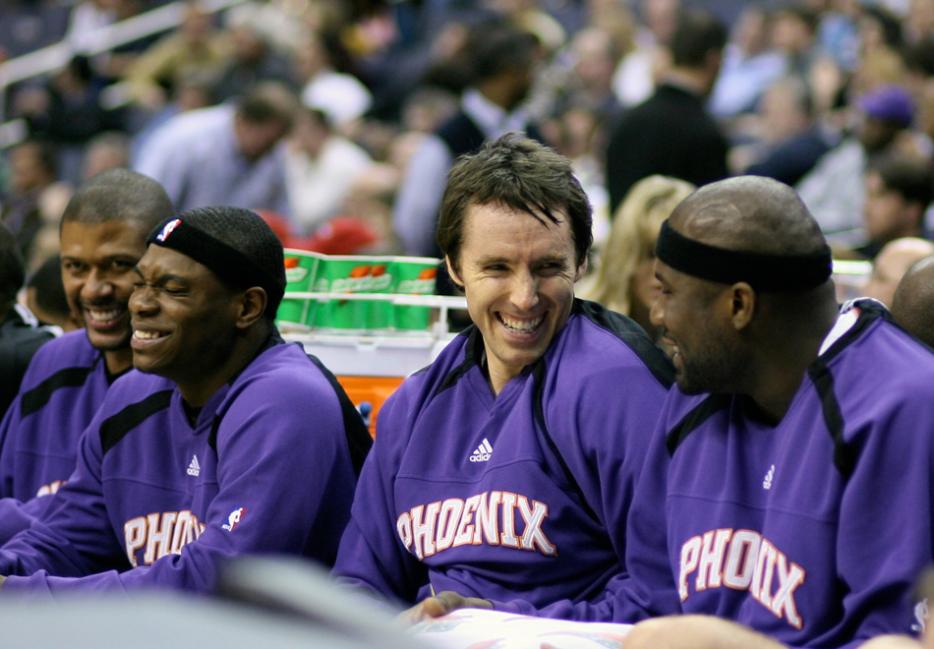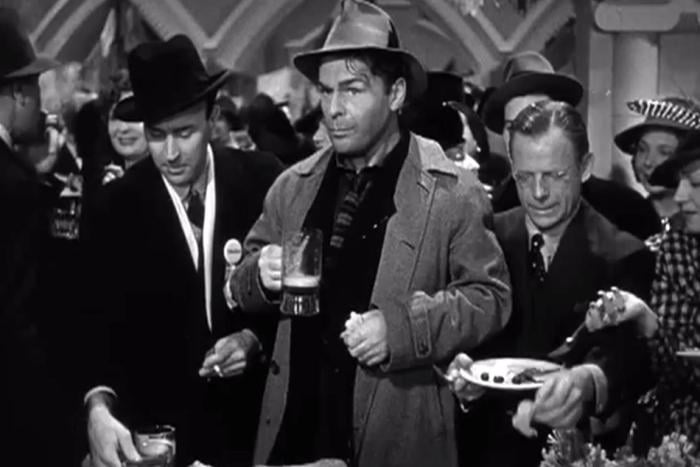Few people are as well versed in both Steve Nash and leadership, in general, as Jack McCallum. The veteran Sports Illustrated NBA writer embedded with Nash’s former Phoenix Suns team during the 2005-06 season for his book :07 Seconds or Less: My Season on the Bench with the Runnin’ and Gunnin’ Phoenix Suns. He then went on to write Dream Team: How Michael, Magic, Larry, Charles and The Greatest Of All Time Conquered the World and Changed the Game of Basketball Forever, a look at the 1992 U.S. men’s Olympic basketball team. All of which is to say, McCallum has been around the greatest leaders in the game, and understands the dynamics of the locker room in pro sports as well as anyone not suiting up each night.
Nash, who just began his 18th professional season, has just received the biography treatment in Steve Nash: The Unlikely Ascent of a Superstar, written by longtime NBA reporters Michael Grange of Rogers Sportsnet and the Toronto Star’s Dave Feschuk. On the occasion of the book’s release, we spoke with McCallum about all things Nash, influence, and hoops.
*
During your time with the Suns, you were able to observe Steve for an entire season. What kind of a leader was he? Was he more of a vocal leader, or did he lead more by example?
Jack McCallum: The difficulty of being a leader in the NBA is interesting because you have 12 guys, [up to] 15 guys, and they’re all making a lot of money. Steve was not the highest-paid person on his team; there were people making more money than Steve. You have 12 egos, 12 guys making a lot of money, you have 12 guys in the public spotlight, and you have 12 guys that are under a coach who is sort of the leader. So it’s not an easy thing.
I think with Steve it was a combination. I don’t think by inclination he’s a vocal leader. I don’t think he sees the spotlight and says, “This is how you’ve got to do it, fellas.” His thing was half, “I’m going to show them the way that I do it,” which is to practice very hard, take care of your body, do proper discipline, do the things that are going to give you a long career, try to look at the big picture—and then vocally, I think he tried to pick his spots. Steve would only do it at times when it really mattered.
For example, in the playoffs, all of a sudden you’d hear him: “Okay, the playoffs are a different situation, guys. We have to turn off the distractions, we have to focus a little harder.” Those were the things I think he realized inherently that, if you say them all the time in December or January, by the time May rolls around they’re going to be tuning you out.
How about Steve’s relationship with [former Phoenix Suns/current Los Angeles Lakers coach] Mike D’Antoni? Could Mike trust him to be an extension of the coach on and off the floor?
When you compare it to other sports, basketball is incredibly small, [and] it is extremely important for the leader, the coach in this case, to have a relationship, a good one, with his leader. If you look in the history of basketball, and I suppose there are exceptions, but the coach always has a relationship with his guy. Phil Jackson and Michael Jordan. Red Auerbach and Bill Russell and Bob Cousy on the Celtics. Phil Jackson when he went to Los Angeles, he had a relationship with Shaquille O’Neal because Shaquille was a leader then, and when Kobe started coming into his own, Phil got his relationship with Kobe. That is the same thing Mike had with Steve, and it was partially because they were on the same page philosophically, but it was also because of their joint understanding that this is not going to work if you are not my guy.
If the leader and the coach are on a different page—as I said, there are probably exceptions—but in general it’s not going to work. Mike and Steve worked together, but again, the key thing that Steve was able to do (and that leaders have to do) is not look like you’re a puppet. There are going to be guys on that team that aren’t seeing eye to eye with the coach; you can’t pretend to be that guy who [says], “The coach is always right.” I saw Steve, at times, play his cards: “Yeah, I know, Mike can be a bit off at times.” That’s a very important thing a leader has to do. He can’t always be held accountable to the head guy or he’s going to lose the troops.
And it’s important for someone in that role to recognize what each teammate or player needs from a leader, how they need to be handled.
You can’t deal with everybody the same. I think one of the things Steve came to realize—and I would almost say resigned himself to—once he got to LA and the Lakers, is that he would be a great natural leader of the Lakers team, but he’s not the leader. Period. End of story. Kobe is the leader. Kobe is not going to listen to Steve. Kobe is not going to pay any attention to what Steve says about the offence, about life, about [playing in] back-to-back games. He’s not going to listen to any of it because he’s Kobe Bryant.
To a lesser extent, on the Suns, even though he was the dominant personality—at that point he was 33, 34 years old, not 40 like he is now—he realized certain guys, like Shawn Marion, he’s not going to get that much out of me chirping at him. What I’m going to do is chirp at the guys who are chirpable. I think Raja Bell was one of those guys. He worked with him a lot. I think some of the younger guys on the team, Steve was in their ears a lot more. Only once in a while can a leader get up and read the riot act to the whole team … I think Steve realized that as much as any guy I’ve seen.
We often talk about the things Steve does off-court, his “nice guy” image. In doing so, do you think we overlook his competitiveness?
I guess this is obvious, but I don’t know how much people would ever think about it: Steve Nash came from… we can’t call it a basketball-playing country [Canada]. He’s an average-sized guy, he’s a Caucasian in a black man’s sport. He went to a not dominant basketball power and for two years in a row he was the most valuable player in the NBA. You cannot make the odds on that. That’s a 10 billion to one. So, the guy had to be competitive and clawing all the way up. By definition, that is how he had to be.
He had this pregame shooting drill that he went through, and the equipment manager for the Suns used to catch balls for him. I didn’t even know he was doing it. One day somebody mentioned he goes to the practice gym before the games and does the drill. That’s being competitive. Away from everybody’s eyes, the things that he needed to do to get to the level that he was at, when I think of his competitiveness I think of those kinds of moments.
Is it important that a leadership style matches up with a person’s personality, that it rings true to who they are as a player and competitor?
Magic Johnson was a born leader. His coach and principal would say when there was racial tension in high school, Magic was a sophomore in high school, they’d bring Magic in to resolve it. Some combination of his size and personality, that guy was a leader from the word “go.” Within the small confines of a basketball team, within the architecture of a basketball team, you can’t fake it. You’ve got to be the guy.
I think another interesting example of that would be LeBron James. When LeBron got to Miami four years ago… LeBron was always LeBron. Everybody knew that, potentially, you were talking about the guy that was the best player in the world, but when LeBron got there, it was not LeBron’s team. It was Dwyane Wade’s team. Dwyane Wade won a championship without LeBron, and there was a perception around the league held by many people, probably including myself, that the tougher guy was Dwyane Wade. That the guy you wanted in the trenches was Dwyane Wade. That this was going to be, had to be, Dwyane Wade’s team—that LeBron was going to have to not be the main guy, even if he was in a way the best player. Well, we were wrong. I think the first year, LeBron did hold back. I think LeBron was not ready to take the reins; now we see what it is. LeBron’s the guy. Trust me, LeBron’s the leader. I think it took him a year to figure that out. When LeBron got to the Olympic team he was not the leader the first year because Kobe was, but by 2012, LeBron was the leader of that team, too.
What were your initial thoughts when you heard Steve was going to LA?
I first thought—now that I’m not covering the league full-time, I can say this—I hoped he would do very well. Personally, I just liked him. There are certain guys in the business you like and want them to do well, even though you’re not supposed to be a rooter. My second thought was actually about leadership: it was going to be interesting to me to see that somebody who had been a leader was going into a situation where he was going to play with one of the most dominant personalities in the history of sports, and trust me, Kobe Bryant is that. Kobe Bryant is every bit in that light of Michael Jordan. Magic Johnson, he’s not the same kind of leader, but he’s a dominant personality. I thought that Steve would do well in that respect because, as I said, he wasn’t the kind of leader that always wanted the microphone. It wasn’t “my team or bust.”
How difficult do you think it would be to try to be a leader in the Lakers locker room last season? You have Steve and Kobe, a disgruntled Dwight Howard and the sometimes-unpredictable Metta World Peace. Do you think it would have been as much of a distraction as it looks like on the outside?
Make no mistake, it was a messed-up locker room. I think Kobe, and I would say this to his face: Kobe is a difficult guy. He’s the best guy in the world when you’re winning and you will win with him. He’s won five championships, and a lot of them have been due to him, but I don’t think he’s the best guy when you’re not winning. The Fleetwood Mac song, “Go Your Own Way”—you have to remember what else was going on there. Steve was new and injured. D’Antoni was new and injured. Dwight Howard was new and injured. The rest of the guys, Metta World Peace, God bless him, but he’s on another planet. Kobe goes his own way, but he’s on planet Earth.
Kobe in his own way is really grounded. He’s kind of simple: we’re going to win, I’m going to kick your ass, we’re going to play as hard as we can, you’re going to give me the ball. But they had some of the worst ingredients. No one else was really a leader. Stevie Blake, good guy, Antawn Jamison, very good guy, Earl Clark… but there was no other leader there. Those guys, what they went through, that was honestly as bad, when you couple in the injuries and the newness and the problems offensively—Pau Gasol was injured also—it couldn’t have been worse ingredients. And no leader. You can say that Steve should have done a better job, or D’Antoni should have done a better job or Antawn Jamison should have stepped up with a better voice, but those guys, it was a miracle they made the playoffs, honestly.
You’ve been around some of the biggest names and most outsize personalities in basketball. Why do people follow one loud voice and not another?
At the end of the day—to use the greatest cliché—at the end of the day, sports is a marathon pursuit. You’re going to have to prove it. Particularly on a small basketball team, you’re going to have to be good. You’re going to have to bring the goods for 82 games. You’re going to have to be Steve Nash-level to win an MVP. I don’t think anybody would listen to Kobe, I think Kobe would be totally tuned out, he would be unpopular, he would be looked upon as a bully, he would be looked upon as somebody who is always bitching at somebody else, if he wasn’t so damn good. He is just so good, and that is why Kobe is a leader.
Michael Jordan was a leader for a lot of the same reasons. Michael is a little more like Kobe than he was like Magic Johnson. Magic Johnson was a leader because he was both good and he was diplomatic. Larry Bird was a leader because he was a little bit more in that Kobe/Michael Jordan range. “Shut up, follow me, and let’s get out and do it.” I think mostly in sports you’re going to find that leaders, there are exceptions, but leaders are going to have to be good players. They’re not going to be guys who come to look into a business and look like they know what they’re talking about, and it’s going to take you three years to figure out that they’re assholes that don’t know what they’re talking about. In sports, you’re going to figure out in about 20 games whether I’m going to follow this guy down the road or whether he’s not worth it.
And you found those leadership dynamics applied in the same way when you were researching and writing Dream Team?
I think people looking at it from the outside would have a kind of simplistic definition of leadership. You would think, “Okay, let’s kill ‘em guys! Let’s smash our helmets and go out there and go get ‘em,” that would be leadership in sports. It is much more nuanced than that.
With Magic Johnson, he came into a situation in Los Angeles, he’s 20 years old. Twenty years old. He’s being teamed with Kareem Abdul-Jabbar—at the time, the most dominant player in basketball, one of the greatest players ever, an intelligent man, a very unforgiving, tough guy. Magic as a 20-year-old kid learned how to be the leader of that team by sometimes ceding the stage to Kareem. Always mentioning him, always going out of his way, saying, “Hey, it’s not my team, it’s Kareem’s team,” when in fact everyone knew he was the leader from the first day he came in there.
At the same time, Larry Bird was doing it completely differently. He understands that he can’t do that. His first three weeks in Boston, he goes up and tells the lazy guys on his team, “I’m going to kick your ass every day until you get up to my level.” That’s sort of the way Michael Jordan did it. Steve, he got on teams where he wasn’t the best player. You could argue—I wouldn’t argue this—but his years on the Suns, somebody could have said Amar’e Stoudemire was potentially a better player, and Shawn Marion would have argued he was a better player than Steve. Steve had to do it completely differently. He had to do it different from the way Magic did it, differently than Bird did it, different from the way Michael did it.
I think in sports you’re dealing with a coach, you’re dealing with a public, you’re dealing with fans, you’re dealing with being the face of a franchise. All of that requires a much more nuanced look at leadership, and I really give athletes a lot of credit for that, because one of the things I’ve always said about them is that they are going out and doing this in the public eye, and they’re explaining themselves every single night. The CEO of a company can go bury himself, even if he’s responsible to shareholders, he can go bury himself away, and what he’s done to screw up may not become evident for six months. Basketball teams, football teams, baseball teams, that can’t happen. Now, I’m not saying the stakes are the same, but I’ve always admired that about athletes—that they’re out there doing it every night, they’re out there explaining themselves every night, and that’s especially true for leaders on the team.
This interview has been edited and condensed.





